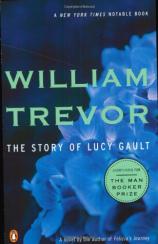Reading Group Guide
Discussion Questions
The Story of Lucy Gault

1. The Story of Lucy Gault is as much about what doesn't happen, or what almost happens, as what does. Lahardane is almost set afire, Lucy comes close to marrying Ralph, Everard writes letters to Ireland but does not send them. What other instances reveal the significance of things not happening? Is the novel saying that what we do not do shapes our lives as much as what we do do?
2. What role does chance play in the novel? What crucial turning points are brought about by chance occurrences? Does this preponderance of chance events suggest the hand of fate directing the characters' lives, or rather a meaningless randomness, the absence of fate?
3. Lucy blames herself, her rash decision to run away, for her parents' leaving; her parents blame themselves for not being more sensitive and honest with their daughter. "We told her lies," Everard says (p. 31). How should the blame be apportioned between Lucy and her parents? To what extent are larger historical and political forces to blame for what happens to the Gault family?
4. Lucy's mother and father conclude that Lucy is dead when they find some of her clothes along the ocean's shore. What are the tragic consequences of this misreading? Why aren't they able to search the woods, to think of other possibilities? What is the novel saying about the role of misinterpretation in our lives?
5. Why does Lucy reject Ralph's impassioned marriage proposals? What are the consequences of this rejection, for her and for Ralph? Was she mistaken to turn Ralph down, or was her rejection her only real option, given her peculiar history, her character, and the circumstances of her life?
6. Heloise Gault imagines uncovering her feelings to her husband: "She heard her voice apologizing, and talking then of all she didn't want to talk about; before she closed her eyes she found the sentences came quite easily. But when she slept, and woke after a few minutes, she heard herself saying she couldn't have that conversation and knew that she was right" (p. 84). Why can't she have that conversation? How might it have helped her? Where else in the novel does the inability to communicate openly and directly have disastrous consequences?
7. Why does Lucy visit Horahan, the man who as a boy helped set in motion the events that caused so much pain, after he's gone insane and been confined to the asylum? Are her visits an act of forgiveness? What effect do these visits have on Horahan? On Lucy herself?
8. In retelling the story of the Gault family, travelers and people in the surrounding towns embellish the narrative. "In talk inspired by what was told, the subtleties that clogged the narrative were smudged away. The spare reality of what had happened was coloured and enriched, and altogether made better. The journey the stricken parents had set out upon became a pilgrimage, absolution sought for sins that varied in the telling" (p. 70). What are the subtleties that clog the narrative? Is the parents' journey a kind of pilgrimage? Have they sinned? Why are subtleties so important in truly understanding a story?
9. Compared to much contemporary fiction, The Story of Lucy Gault is an uneventful, quiet book. How does it achieve such power in the absence of dramatic action? How does Trevor draw out the spiritual implications of his story? What are those implications?
10. At the end of the novel, the nuns visit Lucy, drawn by her extraordinary peacefulness. "Her tranquility is their astonishment... Calamity shaped a life when, long ago, chance was so cruel. Calamity shapes the story that is told, and is the reason for its being: is what they know, besides, the gentle fruit of such misfortunes' harvest? They like to think so...." (p. 224). Are the nuns right in sensing a transcendent calm in Lucy? If so, how has she achieved this peace? Can her life be said to have been, on balance, a good life?
The Story of Lucy Gault
- Publication Date: August 26, 2003
- Paperback: 240 pages
- Publisher: Penguin (Non-Classics)
- ISBN-10: 014200331X
- ISBN-13: 9780142003312






